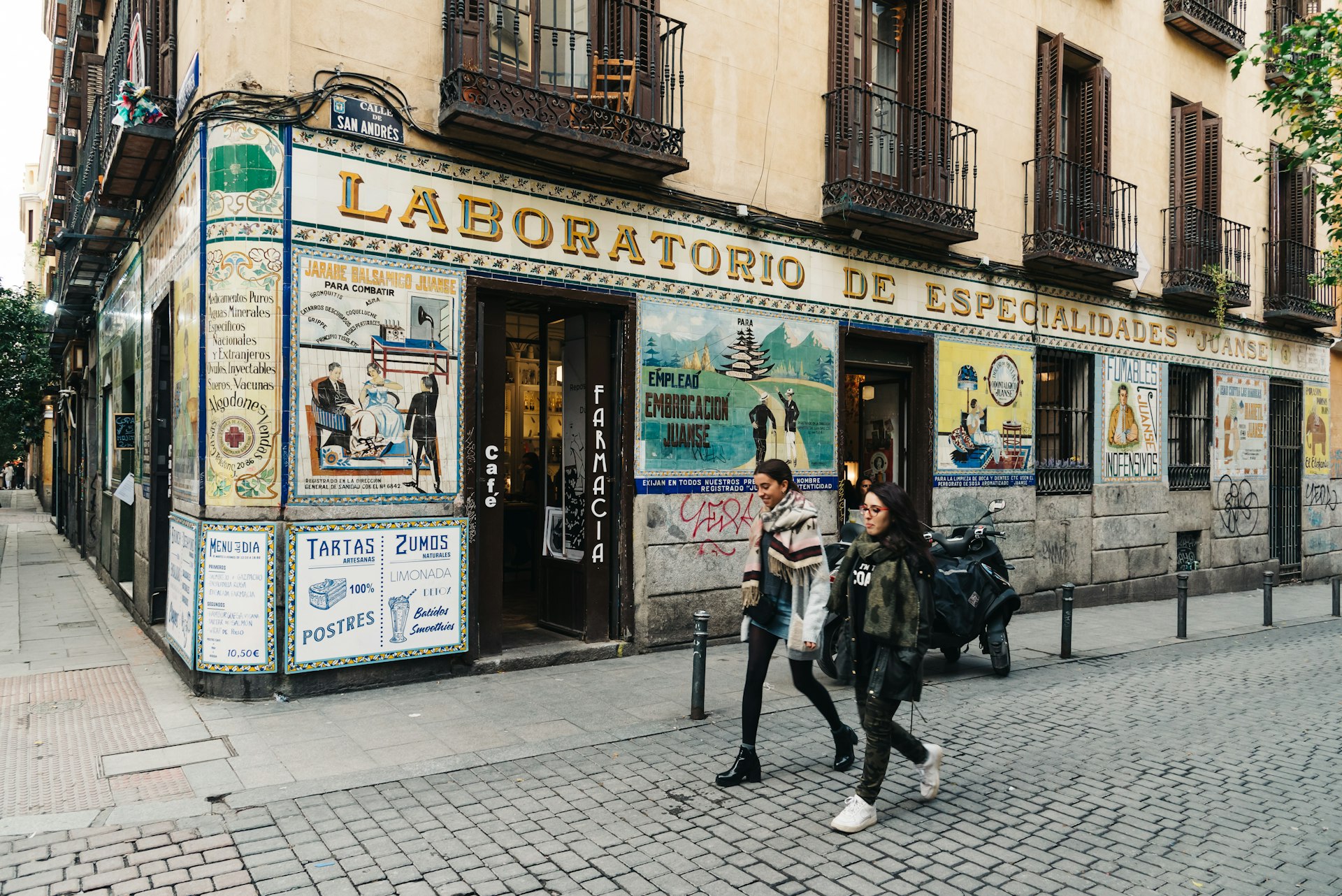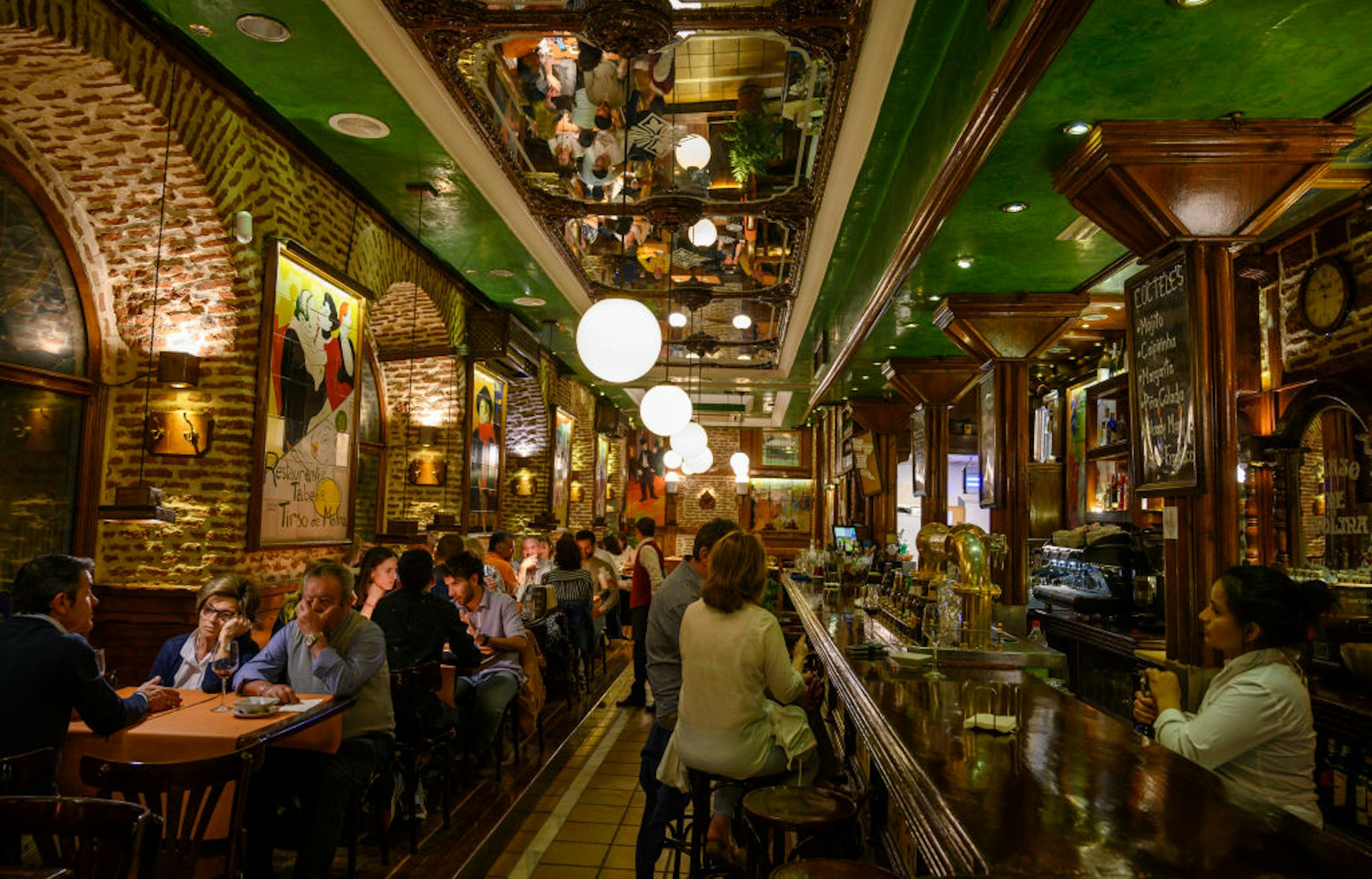De Madrid al cielo (‘from Madrid to heaven’) is a popular local expression that fittingly describes the Spanish capital.
With historic landmarks, an array of culinary choices, picturesque plazas and world-famous nightlife, there’s a little piece of heaven awaiting every traveler.
Take some time to explore Madrid’s sunlit barrios (neighborhoods) and you’ll discover pockets of vibrant Spanish life that each have a distinct character. Here are our picks of the best neighborhoods to visit on your trip to Madrid.
1. Sol (Centro)
Best neighborhood for sightseeing
No visit to Madrid is complete without seeing its main square, the Plaza de la Puerta del Sol (or simply ‘Sol’). The symbolic center of Spain and its main crossroads, Sol is a bustling plaza that has been the city’s social hub since the 19th century. It’s packed with landmarks, including the equestrian statue of King Charles III, the beloved Bear and Strawberry Tree sculpture that represents the Madrid coat of arms, and the Casa de Correos (post office), which is crowned by a famous clock that counts down to midnight on New Year’s Eve, as revelers eat the traditional 12 grapes along with each chime.
Ten streets radiate from Sol, so you can easily venture out to many of Madrid’s most famous landmarks nearby, such as the main boulevard of Gran Vía, Plaza Mayor, Palacio Real, Almudena Cathedral and Mercado de San Miguel. If you need to pack your Madrid sightseeing into a day and don’t mind overpriced tourist rates, then staying in Sol is a strategic decision. As well as the attractions within walking distance, there are three Metro lines that pass through Sol station, giving you easy access to many different points in the city.

2. Retiro
Best neighborhood for nature and art walks
Madrid’s Retiro district is named after the Parque del Buen Retiro, a sprawling 118-hectare green oasis that was once reserved for Spanish royalty. Today it is open to all, so you can escape the busy city center and explore its stylized gardens, decorative fountains and statues, which include the famous Ángel Caído (Fallen Angel) depicting Lucifer’s fall from the heavens.
A short walk from the park’s northwestern gates takes you to the Paseo del Prado, a UNESCO World Heritage-listed avenue featuring some of the world’s most greatest art museums, primarily the Museo del Prado, home to several masterpieces by Spanish artists Francisco Goya, Diego Velázquez and Francisco Zurbarán. A stone’s throw from the Prado is the Museo Thyssen-Bornemisza, which showcases nearly 1000 paintings by celebrated European and American artists from the 13th to the 20th century. You’ll find an eclectic mix of works from Dalí, Van Gogh, Edward Hopper, Joan Miró and Jackson Pollock, among others.
This neighborhood is a great pick if you’re visiting Madrid for the first time but have limited time, as you can visit several of the capital’s emblematic landmarks with one walkabout along the Paseo del Prado, including the magnificent Palacio de Comunicaciones and Cibeles Fountain in the Plaza de la Cibeles, and the Puerta de Alcalá, the majestic neo-classical gate that towers above the Plaza de la Independencia.

3. Malasaña
Best neighborhood for nightlife
Colorful, offbeat and graffiti-covered Malasaña was the beating heart of Madrid’s counterculture and artistic movement in the 1980s, after the end of the Franco dictatorship. That rebellious energy lingers on today in Malasaña’s labyrinthine streets, which are dotted with whimsical cafes, restaurants and vintage shops. At night its myriad bars and clubs open their doors, spin vinyl and transform Malasaña into one big street party that usually lasts until the early hours. To soak up the sun and mix with friendly locals, head to the outdoor terraces of the Plaza Dos de Mayo, Malasaña’s central square, which commemorates the uprising of the people of Madrid against Napoleon’s occupying forces in 1808.

4. Chueca
Best neighborhood for LGBTQI+ visitors
Out-and-proud Chueca is Madrid’s rainbow flag-draped neighborhood that never sleeps. This is the main playground of the city’s famous Día del Orgullo de Gays, Lesbianas y Transexuales, the Pride festival that kicks off the summer season every year. LGBTIQ-friendly accommodations and stylish boutique hotels abound, such as the kitschy Room Mate Oscar, known for its rooftop terrace that offers panoramic views of Madrid. At any time of day, Plaza de Chueca is a great place to lounge and people-watch in its many outdoor terraces and cafes.

5. Salamanca
Best neighborhood for luxury
Salamanca is Madrid’s wealthiest and most glamorous neighborhood. Designed in the late 19th century as an exclusive enclave of the Spanish aristocracy, it is distinguished by its grid-like streets and exquisite building facades. Today it is a haven for luxury shopping thanks to the Golden Mile, a network of streets lined with designer fashion boutiques that draw a well-heeled crowd. In between shopping you can dine and sip rioja among the chic set in elegant outdoor terraces and upmarket restaurants.

6. Lavapiés
Best neighborhood for culture
Thanks to the crucible of cultures living here, Lavapiés offers the most multicultural food choices in Madrid. The streets are lined with restaurants, cafes and tea houses offering affordable, delicious dishes from South Asia, Africa and the Middle East. The colorful cultures of the neighborhood’s residents play out in its arts scene too, whether in vibrant street art, pocket galleries, live music, or spontaneous street dancing.
La Tabacalera is a refurbished tobacco factory transformed into a cultural center that regularly hosts concerts, exhibitions and film festivals. The Centro de Arte Reina Sofía exhibits some of the greatest masterpieces of contemporary Spanish art, including Pablo Picasso’s iconic Guernica.

7. La Latina
Best neighborhood for tapas
Vestiges of Madrid’s medieval past can still be seen in La Latina, the city’s oldest quarter, which to this day has maintained its many wide public squares and narrow cobblestone streets. Crowning this historic neighborhood is the dome of the Basílica de San Francisco El Grande, home to priceless Spanish paintings including Francisco Goya’s St Bernardino of Siena Preaching to Alfonso V of Aragon.
Every Sunday morning this historic quarter hosts a 400-year-old flea market, El Rastro, which peddles every curiosity under the bright Spanish sun. Hand in hand with this tradition is the requisite Sunday tapas-and-drinks crawl along the surrounding streets. One of the best is Cava Baja, which hosts some of Madrid’s oldest restaurants and watering holes, such as the Posada de la Villa, a former flour mill dating back to 1642.
8. Barrio Chamberí
Best neighborhood for immersing among locals
North of Madrid’s city center is a charming, tree-lined barrio that has become one of the most sought-after residential areas, owing to its mix of elegant architecture, family-run shops and modern establishments. This is where to go if you want a local experience away from the tourist traps, with plenty of cozy cafés, traditional markets and vibrant plazas like the family-friendly Plaza Olavide to explore. Every evening the popular Calle Ponzano becomes a lively destination for young professionals to enjoy ‘un after-work’ before heading to eat in one of the quaint restaurants.
One cultural attraction that you cannot miss in this barrio is the Museo Sorolla, the former home of renowned Spanish artist Joaquín Sorolla. Sitting serenely amid gardens designed by Sorolla himself, the museum houses a collection of his exquisite paintings and his former studio.
